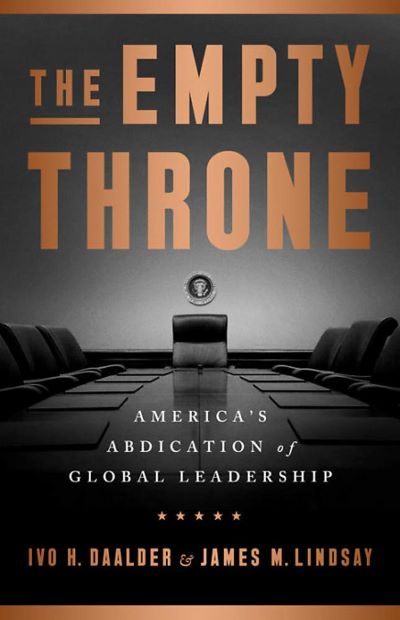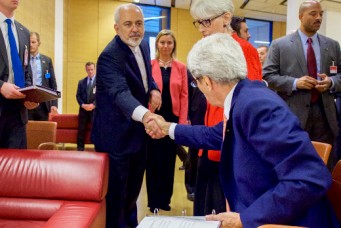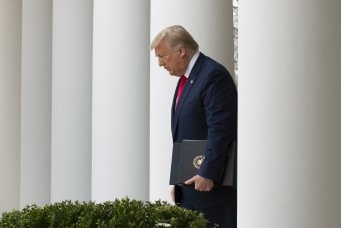Has America’s Influence Ebbed?
How Donald Trump trashed the post-Cold War international order
The Empty Throne: America’s Abdication of Global Leadership. By Ivo H. Daalder and James M. Lindsay, Penguin Random House, New York, 2018, 256 pp.
One of the most beloved American Christmas movie classics, It’s a Wonderful Life, released in 1946 and broadcast every year since, tells the story of the fictitious Bedford Falls and a decent and generous small-town banker played by Jimmy Stewart who attempts suicide after his bank fails. He is saved by an angel, who then takes Stewart on a tour of his hometown as if he, Stewart, never existed to show him what Bedford Falls would have looked like without his influence and leadership. The town sans-Stewart was a poor and depressed backwater. Likewise, countries across the world are now catching a troubling glimpse of a world without American leadership, described by one Japanese diplomat as a state of existence where “the throne is empty.”
Ivo Daalder and James Lindsay in their book The Empty Throne: America’s Abdication of Global Leadership describe the Trump administration’s foreign policy. Both authors served in the Bill Clinton and Barack Obama administrations and write as liberal internationalists. Unlike most liberal Trump critics, Daalder and Lindsay generally avoid personal attacks on, conspiracy theories against, and undocumented accusations directed at the sitting president.
Instead, they have chosen to let President Donald Trump speak for himself, which may be more damaging to the president’s reputation than their critique. The authors acknowledge some similarities between Obama’s and Trump’s populism, but the most important connection they ignore. Both men won the presidency using anti-free trade, anti-globalist, and anti-NAFTA populist rhetoric.
The authors contend that conservative internationalists—the bulwark of much of the Republican Party since Dwight Eisenhower—have been as critical of Donald Trump’s foreign policy as have liberal internationalists, but for different reasons. In a 2019 conference at the American Enterprise Institute, former Vice President Dick Cheney eviscerated Vice-President Mike Pence for the Trump administration’s attacks on free trade and withdrawal from Syria, Iraq, and Afghanistan and charged, much to Pence’s irritation, that there was not much difference between Obama’s and Trump’s foreign policy.
Daalder and Lindsay explain that for seventy years the Republican Party’s platform embraced the brand of internationalism that Trump has been attacking. This is the reason many in the Republican Party’s foreign policy establishment signed two Never Trump letters during the campaign in 2016, and why Trump has had so many senior-level vacant positions in the U.S. foreign affairs apparatus. No issue better illustrates the gap between the president and the Republican Party’s elected representatives on foreign policy than the vote in Congress to impose stiffer sanctions on Russia, approved by the Senate 98 to 2 and the House 419 to 3, which Daalder and Lindsay report, “enraged the President”. Trump finally signed the legislation, under duress, because he realized he had no support for his policy of cultivating Vladimir Putin and ignoring Russian aggression.
The authors give an inordinate amount of attention to Trump’s necessary exit from the Obama administration’s Iran nuclear deal, which they themselves acknowledge had flaws that alarmed even the Joint Comprehensive Plan of Action (JCPOA) treaty’s supporters. In fact, Daalder and Lindsay describe the JCPOA in great detail, stating on page 124, “The restrictions on Iran weren’t permanent, the inspection protocols ‘weren’t foolproof,’ Iran’s missile program was not covered by the deal.” The authors go on to explain that sanctions relief would provide funds for Iran’s efforts to destabilize the region, and to stimulate the Iranian economy to finance those efforts. Most importantly, the JCPOA was supposed to moderate Iran’s international behavior which, they acknowledge, had not occurred. In fact, based on the authors’ own summary of its weaknesses, it would be difficult to see how anyone would have supported the Iran deal in the first place. The risk was—until the Trump administration’s action—that the JCPOA would anesthetize policymakers like Daalder and Lindsay into the delusion that Iran had abandoned its nuclear ambitions.
The authors explain that while America’s allies may not see the United States attempting national suicide as did Jimmy Stewart’s character in It’s a Wonderful Life, the Trump administration’s disinterest in much of what is happening in the world is setting the stage for a future crisis. Both authors acknowledge that the ultra-nationalist, protectionist, nativist, quasi-isolationist sentiments sweeping the world parallel the 1930s when similar trends took place. While President Trump did not create these movements, he has embraced and legitimized them, write Daalder and Lindsay. These policies gave us a world war—arguably one of the greatest catastrophes in world history—and could again.
In fact, the first two chapters of the book are a review of the creation and management by successive U.S. presidents of the post-WWII order which sought to correct the mistakes made after WWI so that Europe and the rest of the world could avoid being drawn into yet another global war. They remind readers of the historical roots—which President Trump seemed oblivious to when he used the same slogan—of the “American First” movement in the 1930s which sought to keep the United States out of World War II and drew Nazi sympathizers.
Perhaps the greatest weakness of the book is the authors’ attempt to separate themselves from their own handiwork in the Clinton administration (when Lindsay was at the National Security Council) and the Obama administration (when Daalder was ambassador to NATO). They rightly criticize their former bosses for their failures in foreign policy, while they understate or dismiss the realist axiom that nation-states naturally act in their own self-interest much of the time, which the Trump administration has certainly carried to a myopic extreme.
Interestingly, even though Daalder and Lindsay are critical of Trump’s bombastic style of populist diplomacy, his provocative policies, and the chaotic execution of Trump administration policies, they are occasionally critical of the Obama administration for its weaknesses and mistakes. The Obama administration’s failures in Libya and Syria continue to reverberate, explain Daalder and Lindsay. In the case of Libya, the authors critique Obama for supporting the purge of a tyrant and then leaving the country to continue in chaos. In Syria, the authors state that President Obama initially made threats that he never made good on, effectively reversing course and damaging U.S. credibility in the process.
Daalder and Lindsay make a persuasive argument that the most destabilizing of Trump’s foreign policies—attacking the U.S. alliance system with fifty-five countries and NATO in particular, trashing free trade, undermining support for democracy and human rights, and supporting nativism—are long-held positions which date back more than thirty years. The authors quote a letter Trump published as a full-page ad in The New York Times in September 1987, in which he announced his foreign policy manifesto that later became his presidential platform.
Public figures are prisoners of their own biographies. President Trump’s habits, management style, and values reflect his career as a real estate developer and reality-TV host. He is an entertainer, entrepreneur, and deal maker and apparently believes that these skills are useful in the presidency. The problem, contend Daalder and Lindsay, is that Trump’s skills are not just a mismatch with what is required for U.S. foreign policy, they are extraordinarily counterproductive.
Major diplomatic moves often cause second, third, and fourth-order consequences which, if not thought through carefully, can lead to unintended and sometimes disastrous results. Daalder and Lindsay argue that Donald Trump’s impulsive temperament, inflammatory rhetoric, and transactional negotiating habits—while solidifying his domestic political base as a tough guy— are ill-suited to coherent foreign policy and successful diplomacy. In May 2019, these habits nearly led to a war between the United States and Iran. It is unlikely Donald Trump will find wisdom, as did Jimmy Stewart, by reflecting on the past. Even if Trump were to contemplate his past, the president’s biography has not prepared him to comprehend the consequences of his actions.
Andrew S. Natsios is an executive professor at the George H.W. Bush School of Government and Public Service at Texas A&M University and director of the Scowcroft Institute of International Affairs. Natsios is also the author of U.S. Foreign Policy and the Four Horsemen of the Apocalypse; The Great North Korean Famine; Sudan, South Sudan and Darfur: What Everyone Needs to Know; and has contributed to thirteen other books.
Read More





